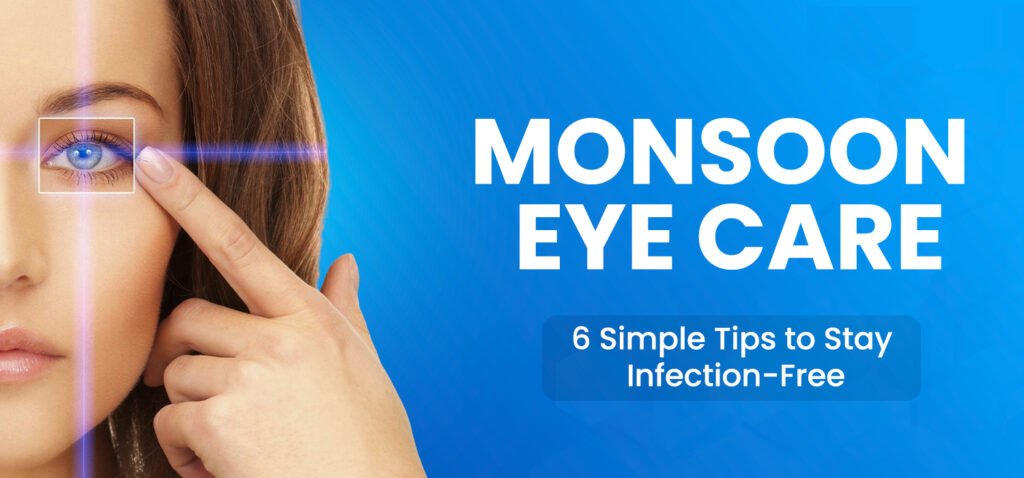Monsoon Eye Care: 6 Simple Tips to Stay Infection-Free

The monsoon season finally came and brought much-needed relief from the scorching summer, but it also comes with seasonal infections, especially those affecting the eyes.’
With increased humidity, stagnant water, and airborne allergens, the eyes become vulnerable to bacterial, viral and even fungal attacks.
According to the Nature’s Eye Journal of 2024 review, fungal eye infections are no longer a countryside concern. Urban rainwater now carries spores that can cause keratitis, especially if you walk through puddles or touch your eyes after exposure.
So, how do you enjoy rain without compromising your vision? Here are 6 eye care tips in the monsoon that are doctor-approved to keep your eyes safe and sparkling.
Avoid Touching Your Eyes with Unwashed Hands
When your eyes feel itchy or irritated, it is relaxing to rub them. However, during the monsoon, this habit can be harmful. Touching your eyes with damp or dirty hands can lead to infections such as conjunctivitis or keratitis, as rainwater carries bacteria.
Quick tip: Wash your hands before touching eyes or always carry a pocket-sized hand sanitizer and use it before adjusting your glasses or wiping your eyes.
Wear Protective Eyewear Outdoors
If you ride a two-wheeler or walk through a drizzle, your eyes are exposed to polluted rainwater or airborne microbes. Here, protective glasses work as a physical barrier covering your eyes from contaminants.
Quick tip: Pick anti-glare lenses if you’re prone to eye strain during cloudy days.
Avoid wearing contact lenses in the monsoon, as it can boost the risk of corneal ulcers due to microbial buildup.
Use Lubricating Eye Drops
Humidity can disrupt your tear film, leading to dry eyes, even on rainy days. If you ever feel irritation or often blink your eyes more than normal, uneasily, then see a doctor.
He might recommend preservative-free lubricating drops to flush out irritants and maintain moisture balance.
Quick tip: Avoid drops unless prescribed by a doctor. Use clean water or ayurvedic rose water rinses for daily use.
Eat Eye-Friendly Foods
Nutrition plays a crucial yet subtle role in eye health. The essential Vitamin A-rich foods, such as carrots, spinach, and mangoes, boost immunity and help your eyes fight off seasonal infections.
Monsoon superfoods for Eyes:
- Amla (Indian gooseberry)
- Pumpkin
- Triphala (Ayurvedic blend for detox and eye care)
With an increase in conjunctivitis cases, doctors are advising dietary changes to support reducing inflammation and improving recovery.
Maintain Strict Eye Hygiene
If you share your towel, eye makeup, or even pillows with others, this can lead to the spread of infections like styes and blepharitis. Sharing is caring, but not in this case.
Be extra careful in crowded monsoon settings, offices, schools, and public transport, as this risk multiplies.
Adopt These Habits:
- Wash eyes with clean, cool water every morning.
- Use separate towels and avoid sharing cosmetics, or wash your makeup brushes after other uses.
- Clean your glasses and phone screens regularly.
Avoid Swimming in Public Pools
Public open pools during monsoon are breeding grounds for adenoviruses and bacteria that cause conjunctivitis and styes. A special care to contact lens wear person as microbes can trap in the contact lens against the eye surface.
Quick Tip: If Swimming is unavoidable for you then, wear sealed swim goggles and rinse eyes with sterile saline afterward.
When to See a Doctor?
If you are experiencing heaviness, persistent redness, itching, blurry vision or swelling, then do not wait. These could be signs of serious infections like conjunctivitis, keratitis or blepharitis. Early intervention can prevent complications.
Final Thoughts
Everyone wants to enjoy the monsoon, and you can with these six simple habits, while keeping infection at bay. Stay dry, Stay vigilant – and let your eyes soak in the beauty of the season, not its bacteria.
Share this blog with someone who’s always caught in the rain without a care for the conjunctivitis.